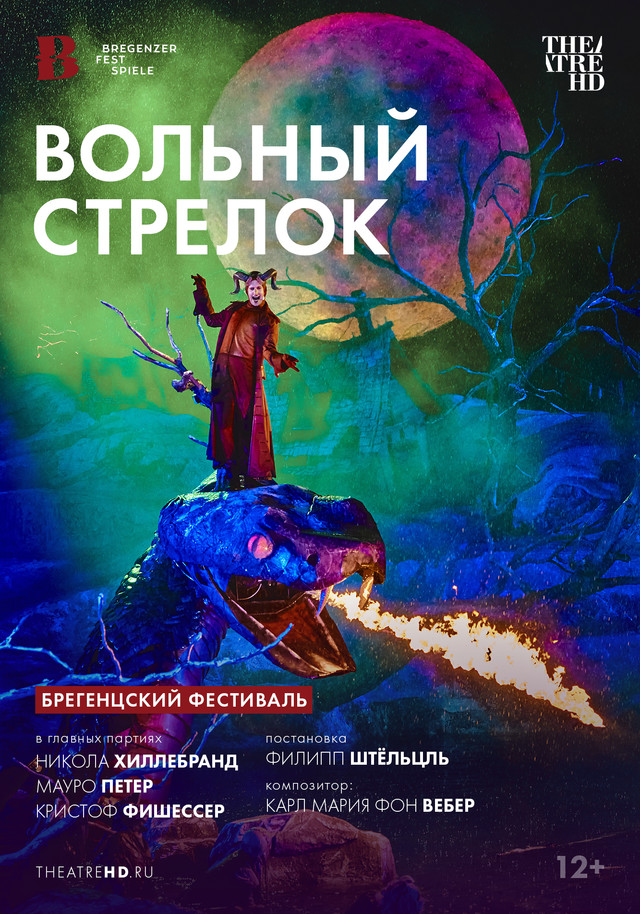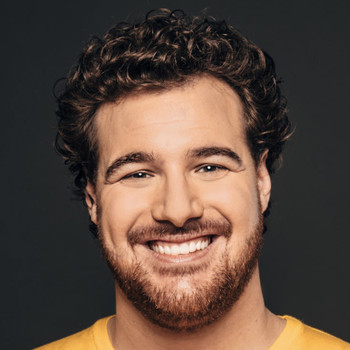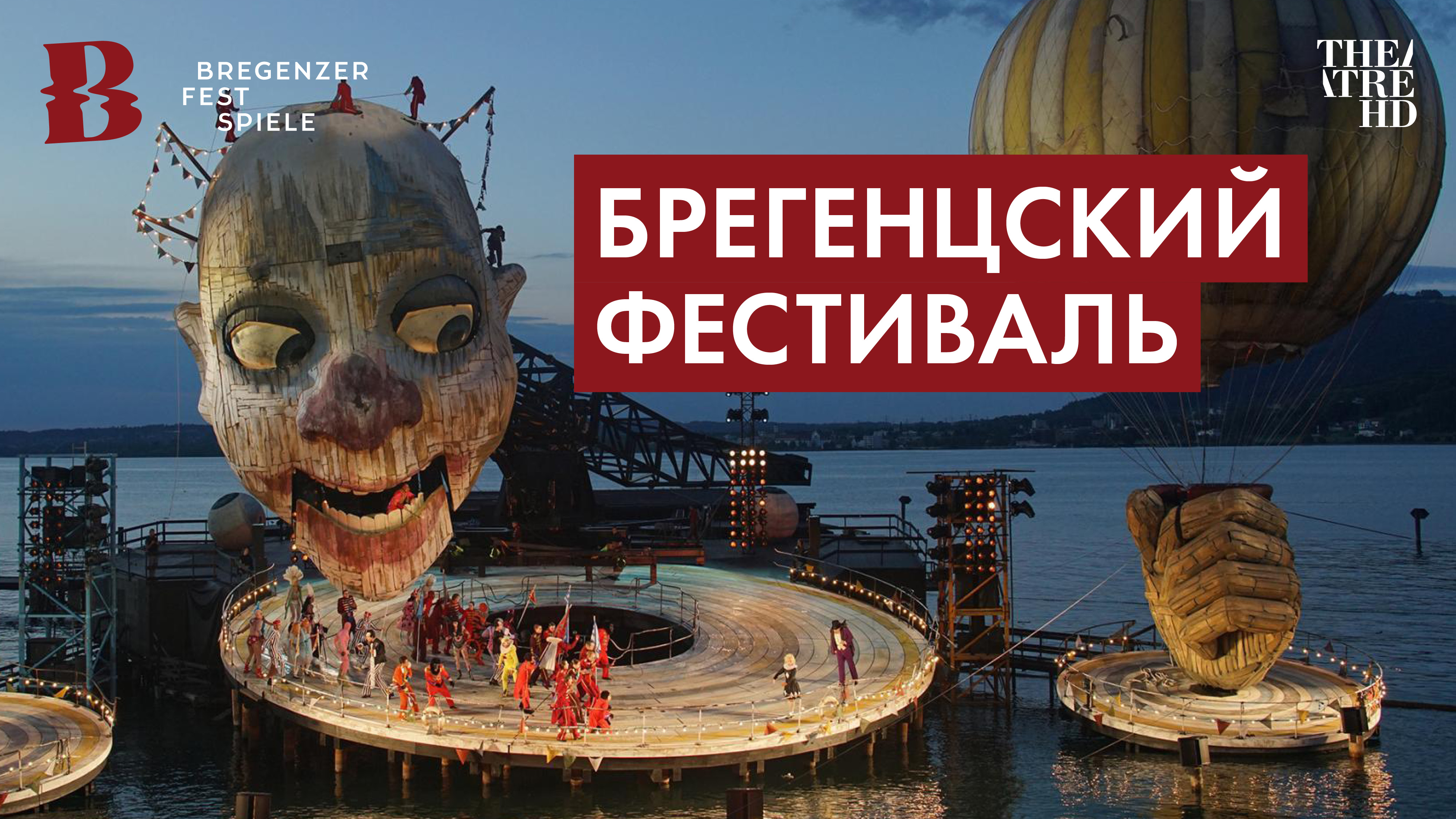
Carl Maria von Weber
Bregenz Festival: Der Freischütz
Брегенцский фестиваль: Вольный стрелок
A phantasmagorical fairy tale on the unique water stage of Lake Constance with incredible sets by Philipp Stölzl.
As one of the most popular operas in the German speaking world, Der Freischütz is now staged on the Seebühne for the first time with director and stage designer Philipp Stölzl and Conductor in Residence Enrique Mazzola.
Actors
Crew
Conductor
Enrique Mazzola
Costume designer
Gesine Völlm
"Bull’s eye", Carl Maria von Weber triumphantly wrote to his librettist Friedrich Kind following the enthusiastically received world premiere of Der Freischütz in 1821 in Berlin. With its emotional and gripping music, it soon became the epitome of the German Romantic opera.
As one of the most popular operas in the German speaking world, Der Freischütz is now staged on the Seebühne for the first time with director and stage designer Philipp Stölzl and Conductor in Residence Enrique Mazzola. The two team up again in Bregenz following the phenomenal success of Giuseppe Verdi’s Rigoletto.
As one of the most popular operas in the German speaking world, Der Freischütz is now staged on the Seebühne for the first time with director and stage designer Philipp Stölzl and Conductor in Residence Enrique Mazzola. The two team up again in Bregenz following the phenomenal success of Giuseppe Verdi’s Rigoletto.
Bregenz Festival
TheatreHD presents a collection of performances from the annual opera festival in Bregenz, renowned for its floating stage on Lake Constance. The vast space allows for the most fantastical scenery to unfold above the water, and the set designers working on Bregenz productions traditionally give free rein to their creativity.
→
Place: Bohemia
Time: shortly after the end of the Thirty Years' War
Act 1
At a shooting contest, the second assistant forester, Max, loses to a peasant, Kilian, who is proclaimed "King of marksmen" (Chorus: Viktoria! Der Meister soll leben—"Victory! Long live the master"). Kilian mocks him good-naturedly (Schau der Herr mich an als König—"Let him gaze on me as king").
Max wants to marry Agathe, daughter of the head forester Kuno. In order to marry her and succeed her father as head forester, he has to prove his marksmanship and score in a shooting trial before Ottokar, the sovereign prince, on the following day.
As Max has had ill luck for several days, he muses upon his prospects of losing Agathe by failing the shooting test (Trio of Kuno, Kaspar, and Max; chorus: O diese Sonne—"O this sun"). Left alone in deep melancholy, he recalls happy days (Aria: Durch die Wälder, durch die Auen—"Through the forests, through the meadows").
Kaspar, the first assistant forester, falsely tries to imbue Max with wine and courage (Hier im ird'schen Jammerthal—"Here in this vale of tears"). He had hoped to marry Agathe himself but she had rejected him and chosen Max. The marriage would make Max the heir of Kuno who would see Max as a son. Kaspar seeks revenge upon all three—his rival, his former sweetheart and her father. He hands Max his gun and Max, to his own astonishment, hits an eagle soaring at a great height. Kaspar explains that the gun had been loaded with his last magic bullet.
He persuades Max to meet him at midnight in the terrible Wolf's Glen to cast seven more of the magic bullets. (Six hit, but the seventh belongs to the Evil One who can guide it wherever he pleases.) He warns Max not to tell a soul about their purpose so as not to endanger them. Left alone, Kaspar triumphs and boasts of his insidiousness (Aria: Schweig’! damit dich niemand warnt—"Silence! So that nobody warns you.").
Act 2
Design for the Wolf's Glen (1822, Weimar)
Agathe's chamber
At the moment when Max shoots the magic bullet, a picture of Agathe's ancestor hanging on the wall falls to the floor, slightly wounding her. Agathe's cousin and companion Ännchen refastens the hook (Duet: Schelm, halt fest!—"Rogue, hold fast!"). She endeavours to cheer Agathe with jests (Ännchen: Kommt ein schlanker Bursch gegangen—"Comes a pretty boy this path"). Agathe, still disturbed, tells of her meeting with the hermit. He had indicated a danger from which his white consecrated roses would protect her.
Left alone, Agathe awaits Max with the news of his success (Recitative and aria: Wie nahte mir der Schlummer...Leise, leise—"How did slumber approach me...Low, low"). Max arrives, acknowledging that while he has not been the victor, he has killed an eagle. Though the night is falling, he has to leave again to bring in a stag which he had shot in the Wolf's Glen (Trio: Wie? Was? Entsetzen!—"What? What? Oh, horror!").
The Wolf's Glen at night
As the bell chimes twelve Kaspar calls upon Samiel, the Black Huntsman, for assistance in casting the magic bullets. Having already sold his own soul, which is due the next day, Kaspar offers Max’s soul in exchange for a prolongation of his soul of three years. Agathe is to be killed by Max's magic bullet, despair will then make Max and Kuno the Devil's. Samiel agrees ambiguously: "So be it—By the gates of hell! Tomorrow he or you!"
As Max arrives, the spirit of his mother warns him to abandon the project. But Samiel conjures up Agathe, seemingly drowning herself in despair, whereupon Max plunges into the glen. With demoniacal noise, the casting of the bullets begins.
Act 3
The meeting of the marksmen
Having split the seven bullets between them, Max has used three during the hunt in the morning. Kaspar spoils his three on a fox. Thus Max's remaining bullet is the seventh, the Devil's bullet.
Agathe's chamber
Wir winden dir den Jungfern-Kranz
Agathe is praying (Aria: Und ob die Wolke sie verhülle—"Though clouds obscure"), her doubts having returned owing to a dream of ill omen where she was a white dove which Max shot. Ännchen tries to cheer her with a ghost tale (Aria: Einst träumte meiner sel'gen Base—"My deceased cousin had a dream"). The bridesmaids bring the box with the bridal wreath (Song: Wir winden dir den Jungfern-Kranz—"We wind round thee the bridal wreath"). But as they open it they find a funeral wreath. Recalling the hermit's promise that the white roses will protect her, Agathe proposes to twine them to the bridal wreath.
Design for the act 3 finale (original 1821 production)
The marksmanship trial
Prince Ottokar awaits Max at his tent (Chorus of foresters: Was gleicht wohl auf Erden—"What excels the pleasures of the chase"). As a test, Max is ordered to shoot the dove pointed out to him. Max takes aim, fires and Agathe, who has just entered the scene, falls as if hit (Finale: Schaut, o schaut—"See, oh see"). But her bridal wreath and the hermit behind her have deflected the bullet
Time: shortly after the end of the Thirty Years' War
Act 1
At a shooting contest, the second assistant forester, Max, loses to a peasant, Kilian, who is proclaimed "King of marksmen" (Chorus: Viktoria! Der Meister soll leben—"Victory! Long live the master"). Kilian mocks him good-naturedly (Schau der Herr mich an als König—"Let him gaze on me as king").
Max wants to marry Agathe, daughter of the head forester Kuno. In order to marry her and succeed her father as head forester, he has to prove his marksmanship and score in a shooting trial before Ottokar, the sovereign prince, on the following day.
As Max has had ill luck for several days, he muses upon his prospects of losing Agathe by failing the shooting test (Trio of Kuno, Kaspar, and Max; chorus: O diese Sonne—"O this sun"). Left alone in deep melancholy, he recalls happy days (Aria: Durch die Wälder, durch die Auen—"Through the forests, through the meadows").
Kaspar, the first assistant forester, falsely tries to imbue Max with wine and courage (Hier im ird'schen Jammerthal—"Here in this vale of tears"). He had hoped to marry Agathe himself but she had rejected him and chosen Max. The marriage would make Max the heir of Kuno who would see Max as a son. Kaspar seeks revenge upon all three—his rival, his former sweetheart and her father. He hands Max his gun and Max, to his own astonishment, hits an eagle soaring at a great height. Kaspar explains that the gun had been loaded with his last magic bullet.
He persuades Max to meet him at midnight in the terrible Wolf's Glen to cast seven more of the magic bullets. (Six hit, but the seventh belongs to the Evil One who can guide it wherever he pleases.) He warns Max not to tell a soul about their purpose so as not to endanger them. Left alone, Kaspar triumphs and boasts of his insidiousness (Aria: Schweig’! damit dich niemand warnt—"Silence! So that nobody warns you.").
Act 2
Design for the Wolf's Glen (1822, Weimar)
Agathe's chamber
At the moment when Max shoots the magic bullet, a picture of Agathe's ancestor hanging on the wall falls to the floor, slightly wounding her. Agathe's cousin and companion Ännchen refastens the hook (Duet: Schelm, halt fest!—"Rogue, hold fast!"). She endeavours to cheer Agathe with jests (Ännchen: Kommt ein schlanker Bursch gegangen—"Comes a pretty boy this path"). Agathe, still disturbed, tells of her meeting with the hermit. He had indicated a danger from which his white consecrated roses would protect her.
Left alone, Agathe awaits Max with the news of his success (Recitative and aria: Wie nahte mir der Schlummer...Leise, leise—"How did slumber approach me...Low, low"). Max arrives, acknowledging that while he has not been the victor, he has killed an eagle. Though the night is falling, he has to leave again to bring in a stag which he had shot in the Wolf's Glen (Trio: Wie? Was? Entsetzen!—"What? What? Oh, horror!").
The Wolf's Glen at night
As the bell chimes twelve Kaspar calls upon Samiel, the Black Huntsman, for assistance in casting the magic bullets. Having already sold his own soul, which is due the next day, Kaspar offers Max’s soul in exchange for a prolongation of his soul of three years. Agathe is to be killed by Max's magic bullet, despair will then make Max and Kuno the Devil's. Samiel agrees ambiguously: "So be it—By the gates of hell! Tomorrow he or you!"
As Max arrives, the spirit of his mother warns him to abandon the project. But Samiel conjures up Agathe, seemingly drowning herself in despair, whereupon Max plunges into the glen. With demoniacal noise, the casting of the bullets begins.
Act 3
The meeting of the marksmen
Having split the seven bullets between them, Max has used three during the hunt in the morning. Kaspar spoils his three on a fox. Thus Max's remaining bullet is the seventh, the Devil's bullet.
Agathe's chamber
Wir winden dir den Jungfern-Kranz
Agathe is praying (Aria: Und ob die Wolke sie verhülle—"Though clouds obscure"), her doubts having returned owing to a dream of ill omen where she was a white dove which Max shot. Ännchen tries to cheer her with a ghost tale (Aria: Einst träumte meiner sel'gen Base—"My deceased cousin had a dream"). The bridesmaids bring the box with the bridal wreath (Song: Wir winden dir den Jungfern-Kranz—"We wind round thee the bridal wreath"). But as they open it they find a funeral wreath. Recalling the hermit's promise that the white roses will protect her, Agathe proposes to twine them to the bridal wreath.
Design for the act 3 finale (original 1821 production)
The marksmanship trial
Prince Ottokar awaits Max at his tent (Chorus of foresters: Was gleicht wohl auf Erden—"What excels the pleasures of the chase"). As a test, Max is ordered to shoot the dove pointed out to him. Max takes aim, fires and Agathe, who has just entered the scene, falls as if hit (Finale: Schaut, o schaut—"See, oh see"). But her bridal wreath and the hermit behind her have deflected the bullet

















